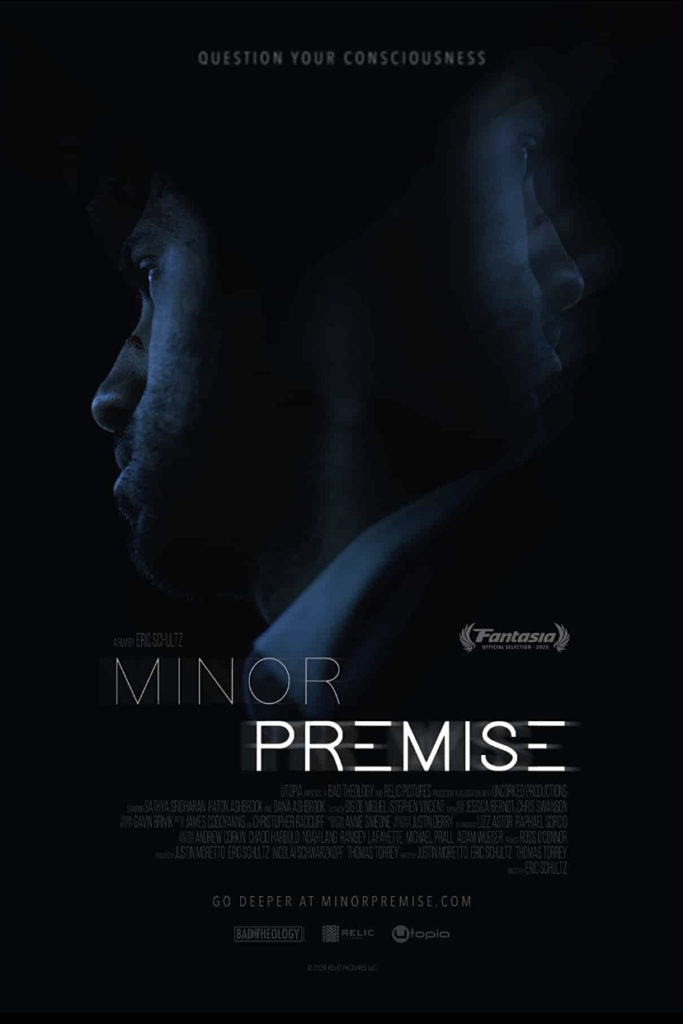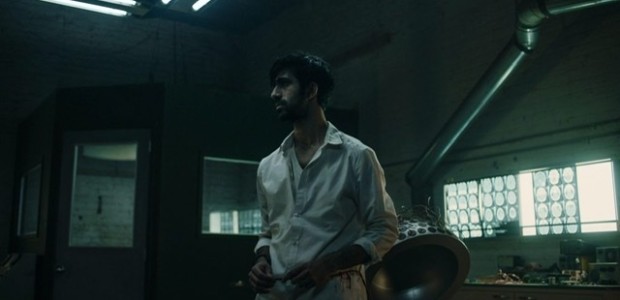The philosophical debate between nature vs. nurture, fate vs. free will and how they apply to a person’s behavior are endlessly compelling because their goal is to attempt to explain why we are who we are. Taken from a purely practical point of view, it would seem that human beings might be able to be broken down into emotional and behavioral sections, variations on an individual’s personality that are influenced by their memories over their lifetime. This is the major premise of MINOR PREMISE, a sci-fi thriller premiering at the 2020 Fantasia Festival that recalls the likes of early 2000s headtrip indies such as MEMENTO (2000) and PRIMER (2004) in the best way. Vibrant, unpredictable, and original, MINOR PREMISE is an exciting feature debut from director/co-writer Eric Schultz and co-writers Justin Moretto and Thomas Torrey, putting a clever spin on “split personality” films by technically not making one. However, like most ambitious films based on big, heady ideas, MINOR PREMISE is a bit emotionally distancing, becoming too engrossed in its plot to really let the characters land.

One of the most impressive things about the film is how well-researched it clearly is, throwing the audience into the deep end of some wild scientific ideas right from the opening moments and never letting up. Prodigal wunderkind developer Ethan (Sathya Sridharan) is continuing the work of his brilliant father (Nikolas Kontomanolis), who had developed a machine called the R9 that allows memories to be mapped and projected on screen (technology that, although at a more primitive state than depicted in the film, actually exists in real life). Ethan’s breakthrough after his father’s untimely death is in creating the R10, a machine that he hopes will be able to use that brain mapping tech in order to program and customize an individual’s personality, leading to the ability for everyone to create their ideal selves. If that concept sets off alarm bells, it’s meant to — one of Ethan’s students instantly raises the ethical questions posed by such a device, and it’s not long before the fragmented structure of the movie hints that Ethan may have already used it improperly. Like any good mad scientist, that’s only the first of his hubristic mistakes, as Ethan then attempts to boost his own intellect, instead accidentally fracturing his psyche into nine distinct emotionally-based personalities (to wit: his intellect, his anxiety, his libido, his anger, and so on). When his ex-girlfriend, fellow scientist Alli (Paton Ashbrook) finds him in this state of disarray, it’s up to the two of them to try and manipulate (as well as deal with) his multiple selves in order to find a way to make himself whole again.
MINOR PREMISE asks a lot of the audience, and it’s impressive that Schultz continually delivers, never letting the movie get away from him by being too cocky or showy. At first, the film appears to open with a scene that seems to be a flash forward (usually a sign of a bad story, taking the most exciting moment and putting it at the beginning as a cheap hook), but this is later revealed not to be the case, and it’s elements like that which build a great deal of trust in Schultz and his co-writers. That trust allows them to make the film aggressively subjective, playing around with jump-cutting and unexpected moments to make the audience as authentically disoriented as Ethan is. When they eventually have to start doling out some answers, it’s done in a manner that is accessible without seeming too dumbed-down, and Schultz is smart enough to keep things moving at a brisk pace so the audience doesn’t have time to poke holes in the plot and ask too many questions. Despite all the heady, science-filled talk, the goal is made clear: Ethan and Alli must fix the machine, lest one of Ethan’s undesirable personalities be allowed to take him over.
That multiple-personality aspect of the movie is its most fascinating, particularly in terms of prior cinematic depictions of Dissociative Identity Disorder. It’s pointed out multiple times that Ethan is not, in fact, suffering from DID, and yet the narrative function of his shifting into a new personality every six minutes is effectively the same. This both makes the film unique yet hurts it, as it tries to push this idea while not being able to rely on the usual tics and tropes of the DID films of the past. While Ethan’s nine states of being are all emotionally ruled, they’re all the same person but with a different emphasis. Yet these different states are portrayed in similar fashion to multiple personalities, without the acting tics and cues that denote them in other movies (like accents, speech patterns, and the like). This makes it hard to understand which “Ethan” Alli is interacting with at any given moment, and further complicating matters is the idea that only two of the nine states are productive: the “default” one and the “intellect” one. As the film takes place over one long, disorienting day and night, the continuity is fractured such that it can be hard to keep the timeline in mind, especially when Ethan keeps reviewing recorded footage of himself and Alli throughout. Ultimately, the plot comes together, yet there are many moments when it threatens to fly off the rails.
While the shaky structure of the film is more of a feature than a bug, the real letdown is the way the emotional aspects of the characters are sacrificed to the big ideas and showy presentation of the movie. The film has a deliberately small cast, but even some of the supporting characters — such as Dana Ashbrook playing a frustrated business partner of Ethan’s — feel too marginalized and wasted. Paton Ashbrook gives a solid performance as Alli, yet thanks to the subjective presentation of the film, she’s only really seen in relation to Ethan — there’s little to show why she stands by this man who clearly hurt her in the past, making her character a bit taken for granted. Sridharan does an admirable job portraying Ethan as a bitter, harried genius who deep down realizes his huge flaws as a person. Yet the concept of the film’s fracturing of Ethan’s psyche means that he doesn’t differentiate the different “Ethans” enough to sell the premise, leaving his brief moments of self-reflection (including a few flashbacks, building on the script’s themes of memory) feeling too distanced to resonate.
MINOR PREMISE gets by thanks to being constantly fascinating and engaging, and any science or philosophy minded person should find more than enough material within to stick with it. It’s just a shame that a film about identity should be so emotionally cold — it’s as if the movie fractured itself with the R10, breaking things down into various elements that work individually but don’t ever quite make a whole. Nonetheless, a movie with this much on its mind deserves attention, especially as it may be predicting a future that could very possibly come to pass. In a way, it already has — its minor (subtextual) premise is the notion that every one of us make a choice, whether consciously or subconsciously, to be a certain version of ourselves at any given moment. The danger lies in which choices we seem to be drawn to most frequently, and making sure they’re not the ones leading us to self-destruction.

Tags: Eric Schultz, Fantasia Film Festival, Justin Moretto, Nikolas Kontomanolis, Paton Ashbrook, Sathya Sridharan, Sci-Fi, Thomas Torrey, Thrillers


No Comments